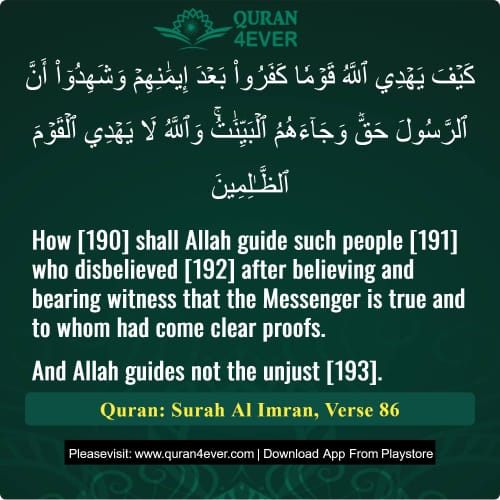
Transliteration:( Kaifa yahdil laahu qawman kafaroo ba'da eemaanihim wa shahidooo annar Rasoola haqqunw wa jaaa'ahumul baiyinaat; wallaahu laa yahdil qawmaz zaalimeen )
"How [190] shall Allah guide such people [191] who disbelieved [192] after believing and bearing witness that the Messenger is true and to whom had come clear proofs. And Allah guides not the unjust [193]."
This verse refers to Jewish and Christian scholars who:
Used to give glad tidings about the coming of the Holy Prophet ﷺ,
And even prayed through his medium before his physical arrival.
Yet after his appearance, they became enemies of him.
This shows that hatred for the Holy Prophet ﷺ results in loss of guidance, and such people are warned:
“They shall not return to the path of guidance.”
These are the Yahud and Nasara who had acknowledged the truth of the Prophet ﷺ based on their scriptures.
Yet when the Prophet ﷺ actually appeared, they rejected him.
Two points emerge:
Their earlier belief was not religious faith, so they are not counted as apostates.
Envy is a major obstacle to guidance, whereas those who err from ignorance are easier to guide.
The “faith” referred to here is not Islamic religious faith, but the acknowledgment found in the Taurat and Injeel.
Therefore, rejection after this does not make them legal apostates, but persistent rejecters of known truth.
Unjust here refers to disbelievers driven by envy and arrogance.
As long as they persist in oppression, guidance is closed for them.
But if they sincerely repent, they may still be guided.
86. How shall Allah guide a people who disbelieved after their belief and after they bore witness that the Messenger is true and after clear proofs came to them And Allah guides not the people who are wrongdoers. 87. They are those whose recompense is that on them (rests) the curse of Allah, of the angels and of all mankind. 88. They will abide therein. Neither will their torment be lightened nor will it be delayed or postponed. 89. Except for those who repent after that and do righteous deeds. Verily, Allah is Oft-Forgiving, Most Merciful.
Ibn Jarir recorded that Ibn `Abbas said, “A man from the Ansar embraced Islam, but later reverted and joined the polytheists. He later on became sorry and sent his people to, `Ask the Messenger of Allah for me, if I can repent.’ Then,
(How shall Allah guide a people who disbelieved after their belief) until,
(Verily, Allah is Oft-Forgiving, Most Merciful.) was revealed and his people sent word to him and he re-embraced Islam.”
This is the wording recorded by An-Nasa’i, Al-Hakim and Ibn Hibban. Al-Hakim said, “Its chain is Sahih and they did not record it.”
Allah’s statement,
(How shall Allah guide a people who disbelieved after their belief and after they bore witness that the Messenger is true and after clear proofs came to them)
means, the proofs and evidences were established, testifying to the truth of what the Messenger was sent with. The truth was thus explained to them, but they reverted to the darkness of polytheism. Therefore, how can such people deserve guidance after they willingly leapt into utter blindness This is why Allah said,
(And Allah guides not the people who are wrongdoers.)
He then said,
(They are those whose recompense is that on them (rests) the curse of Allah, of the angels and of all mankind.)
Allah curses them and His creation also curses them.
(They will abide therein) in the curse,
(Neither will their torment be lightened nor will it be delayed or postponed.) for, the torment will not be lessened, not even for an hour. After that, Allah said,
(Except for those who repent after that and do righteous deeds. Verily, Allah is Oft-Forgiving, Most Merciful.)
This Ayah indicates Allah’s kindness, graciousness, compassion, mercy and favor on His creatures when they repent to Him, for He forgives them in this case.
(3:86) How can Allah guide people who once believed, after they received clear signs and affirmed that the Messenger was a true one, lapsed into disbelief.[73] Allah does not guide the wrong-doers.
73. This is a repetition of the statement made earlier, namely that the Jewish rabbis of Arabia in the time of the Prophet (peace be on him) knew, and sometimes even testified to verbally, that Muhammad was a true Prophet and that his teachings were the same as those of the earlier Prophets. See (Surah Al-Baqarah, ayat 89) Their subsequent attitude – namely that of rejection and opposition – was the outcome of prejudice and intransigence, born out of their centuries-old hostility to the Truth.

For a faster and smoother experience,
install our mobile app now.
Related Ayat(Verses)/Topics